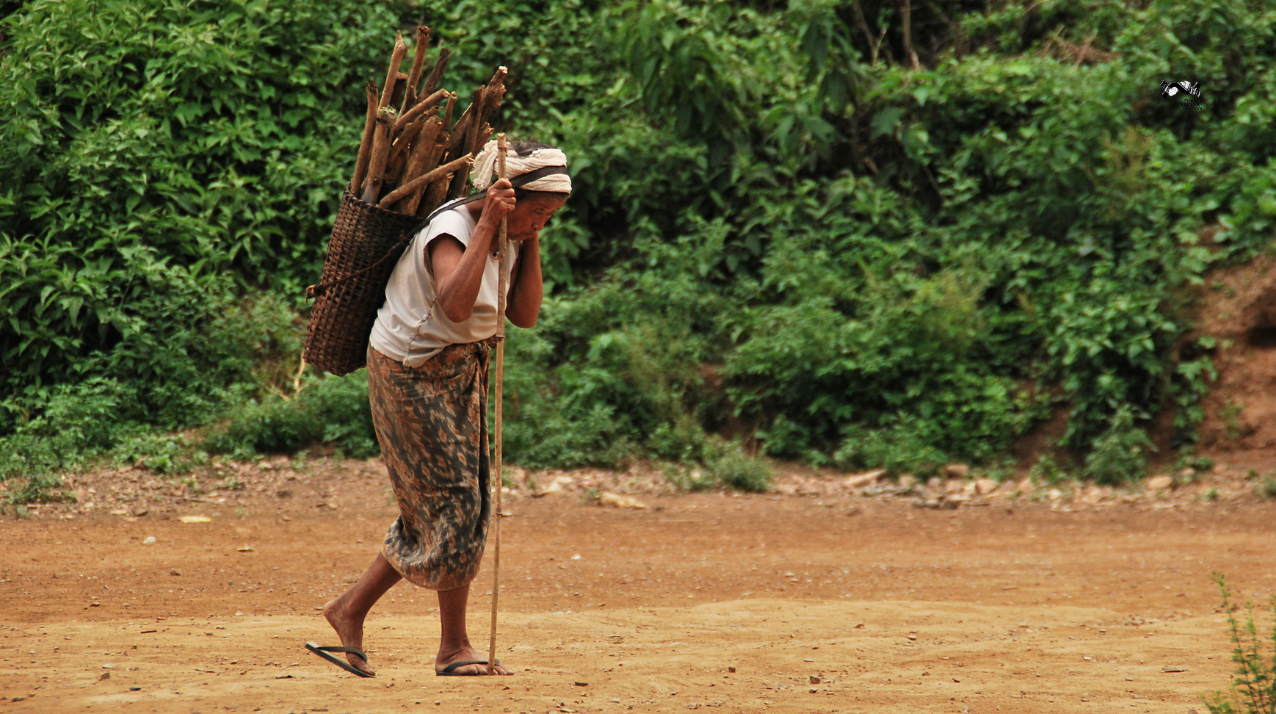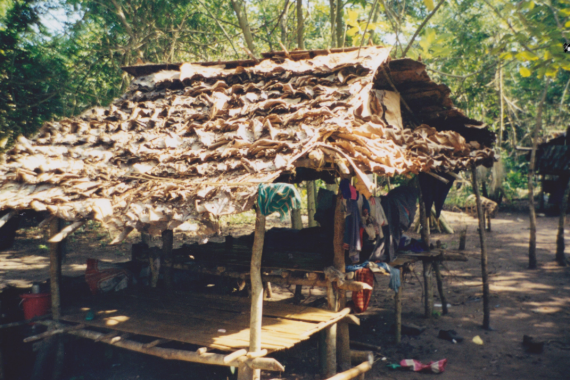“เป็นยังไงมั่งแล้วหือ ไอ้หลานชาย ที่นั่นเป็นยังไง เอ็งจะกลับมาถึงเมื่อไหร่ รู้มั้ยวันก่อนน้าสาวกับน้าเขยของเอ็งนั่งรถหนีน้ำกลับมาหมดไปคนละห้าพัน แล้วยังโชคร้ายถูกจับส่งตัวไปที่ฝั่งพม่า ถูกหน่วยรักษาชายแดน (กองกำลังดีเคบีเอเดิม) เรียกคนละสองพันห้า เท่านั้้นยังไม่พอ ข้ามกลับมาฝั่งไทยยังถูกตำรวจไทยเรียกเก็บอีกห้าร้อย แต่ที่ข้าส่งให้เอ็งไปก็น่าจะพอกลับมานะ เอ็งเลือกรถที่มันเชื่อถือได้หน่อย”
ยายขายขนมจีนในค่ายผู้ลี้ภัยเล่าให้ผมฟังว่าได้คุยกับหลานชายไว้แบบนี้ ในตอนนั้นแกยังหวังว่าหลานจะไม่ต้องเสียเงินหลายต่อหลายตอนเหมือนน้าของเขา แกสอบถามได้ข้อมูลว่าส่วนใหญ่คนแถวนั้นต้องจ่ายค่ารถนายหน้าราว ๆ หัวละห้าพันจึงจะกลับมาค่ายได้ จึงไปกู้หนี้ยืมสินมาได้หนึ่งหมื่นบาท และจัดการส่งให้หลานกับลุงของเขาโดยด่วน
“เห็นภาพข่าวน้ำท่วมกับคนงานถูกปล่อยทิ้งไว้หลาย ๆ ที่แล้วข้านอนไม่หลับ ลูกสาวข้าที่เป็นน้าของไอ้หลานนี่มันเพิ่งไปทำงานที่กรุงเทพฯได้แค่ 2-3 เดือนน้ำก็ท่วม ยังไม่ทันจะเก็บเงินได้เลย เงินที่หาได้ก็จ่ายเป็นค่ารถค่านายหน้าขาที่พาลงไปหมดแล้ว พอเขาให้หยุดทำงาน มันก็เลยต้องกลับ ค่ารถขากลับก็ขอติดหนี้เขาไว้ แต่ดูซิป่านนี้มันยังกลับไม่ถึงค่ายเพราะต้องอยู่ทำงานแถว ๆ ด่านจนกว่าจะจ่ายหนี้ทั้งหมดให้ได้ก่อน ไม่งั้นเขาไม่ปล่อยมันกลับมา”
“วันนั้นหลานชายโทรมาบอกว่ามันกับลุงซื้อตั๋วรถได้แล้ว จะกลับแบบธรรมดา ๆ เพราะถูกกว่า ไม่ต้องเสียค่านายหน้า มันจะเสี่ยงเอา ยายกับแม่จะได้ไม่ต้องเป็นหนี้เยอะ แต่มันก็โชคร้ายถูกตำรวจจับอีก”
หลานชายของยายถูกจับพร้อมกับลุงแถวด้านหน้าสถานีขนส่งนั้นเอง แต่ยายบอกผมว่า ทั้งคู่จะกลับมาถึงค่ายพรุ่งนี้เช้าแล้ว โดยเสียเงินให้กับรถนายหน้าอีกหัวละห้าพันบาท รวมทั้งหมดเป็นหนึ่งหมื่น การเดินทางด้วยนายหน้าขนส่งนั้นแพงมาก ยิ่งในภาวะนี้พวกเขายิ่งโขกราคา แต่หลายคนก็ไม่มีทางเลือก จำเป็นต้องมองว่าคุ้ม เพราะการันตีความปลอดภัยได้พอสมควร เว้นแต่จะโชคร้ายเหมือนรายลูกสาวและลูกเขยของยาย
วันรุ่งขึ้นผมกลับไปหาหลานชายของยายที่ร้านขายขนมจีน เขากลับมาแล้วจริง ๆ
“ตอนตำรวจเรียกผม ผมรู้แล้วว่าต้องมีปัญหาแน่ ๆ ผมพูดภาษาไทยไม่ค่อยได้ แต่ลุงพยายามอธิบายว่าเราขอกลับบ้านเราเท่านั้นเองเพราะน้ำมันท่วม” ชายหนุ่มเล่าให้ฟัง “ลุงผมโทรศัพท์ขอให้เถ้าแก่และตำรวจที่รู้จักกับเถ้าแก่รับรองเรา แต่ตอนนั้นพวกตำรวจก็รื้อค้นห่อเสื้อผ้า แล้วเจอบัตรประชาชนของลุงที่เขาดูออกว่าปลอม เขาขู่ว่า ติดคุกเป็นสิบปีนะโว้ย มีบัตรปลอมน่ะ ผมตัวสั่นไม่รู้จะทำยังไง บัตรนี้เถ้าแก่จัดการให้ลุงทำ เพราะลุงพูดไทยได้ดี ช่วยงานเขาได้เยอะ ถ้ามีบัตรจะไปไหนมาไหนสะดวก เขาหักค่าแรงลุงไปเป็นค่าบัตรตั้งหกพันนะครับ ไม่ใช่ฟรี”
“เราได้แต่ขอเขาว่า คุณตำรวจครับ อย่าจับเราเลย จะเอาอะไรไปก็ได้ เราให้คุณทั้งหมด แต่ผมต้องทำงานเลี้ยงแม่กับยายของผม ถ้าผมติดคุก เขาจะทำยังไง แม่ผมไม่ค่อยสบายด้วย เราบอกเขาว่าเราไม่มีเงินมากหรอก น้ำท่วมแบบนี้เถ้าแก่ไม่จ่ายเงิน มีแต่เงินที่ยายของผมส่งมาให้เป็นค่ารถกลับบ้านหมื่นนึง จ่ายค่าตั๋วรถกลับบ้านก็หมดไปพันแล้ว”
ตำรวจเรียกชายหนุ่มและลุงไปที่ลับตาคน
“เขาว่า.. กูจะปล่อยมึงไป แต่ไม่ต้องพูดมาก เดี๋ยวคนอื่นจะหาว่ากูเรียกเงินมึง นี่กูปล่อยเพราะสงสาร..”
ชายหนุ่มและลุงสูญเสียเงินทั้งหมด รวมทั้งตั๋วรถที่ติดอยู่ในกระเป๋าสตางค์ที่ตำรวจเอาไป ตำรวจให้เงินติดตัวเขาไว้ 100 บาท ใช้เป็นค่าแท็กซี่นั่งกลับไปหานายจ้างและติดต่อกับยายที่ค่ายผู้ลี้ภัยใหม่ ค่าแท็กซี่นั้นตกสองร้อยกว่าบาท เขาต้องขอให้นายจ้างออกให้ไปก่อน เมื่อได้เงินก้อนใหม่จากยายแล้วจึงคืนเงิน และฝ่ายลุงติดต่อหารถนายหน้ากลับมา
ผมฟังเรื่องราวทั้งหมดแล้วกลืนขนมจีนที่กำลังเคี้ยวอยู่แทบไม่ลง ตอนนี้ยายติดหนี้แล้วรวมสองหมื่นบาท แผงขนมจีนเล็ก ๆ ในค่ายผู้ลี้ภัยไม่ใช่จะทำกำไรอะไรมากมาย ผมดูข่าวโทรทัศน์เรื่องน้ำท่วมอยู่ทุกวัน มีคนอธิบายว่า รัฐบาลไทยจะทะยอยส่งแรงงานจากประเทศพม่าที่ได้รับผลกระทบจากน้ำท่วมครั้งนี้กลับอย่างดี แต่ผมกลับเห็นคนในค่ายผู้ลี้ภัยซมซานกลับมากันเองด้วยหนี้มหาศาล หลายคนถูกเจ้าหน้าที่หรือคนที่บอกว่าตัวเป็นเจ้าหน้าที่ปล้นระหว่างทาง มีคนเล่าให้ฟังด้วยว่าที่ชายแดนนั้น เจ้าหน้าที่ฝั่งไทยสั่งให้คนที่ไม่มีเงินจะให้หรือมีน้อยวิดพื้นคนละ 50 ครั้งและตบหัวคนละทีสองทีแทนค่าปรับ
.
“เรามันคนไม่มีบ้านไม่มีเมืองจะอยู่ เรามันคนทุกข์ยากอยู่แล้ว ทำไมเขาถึงทำแบบนี้อีก” ยายถามผมเหมือนไม่ได้ต้องการคำตอบ แล้วแกก็พูดต่อว่า “เขาจะทำกับเรายังไง เราก็ต้องทนไป”
ผมถามหลานชายว่า แล้วเขากับญาติ ๆ เหล่านี้จะกลับไปทำงานที่กรุงเทพฯอีกไหม เขาตอบผมว่า ถ้าน้ำลด ก็คงจะกลับไป เพราะพวกเขาติดหนี้คนไว้มากมาย จำเป็นต้องไปทำงานหาเงินมาใช้หนี้ “แต่ตัวผม ผมคิดว่าผมจะตัดสินใจสมัครไปประเทศที่สามดีกว่า ผมเองก็มีบัตรยูเอ็น จะไปก็ไปได้ ตอนนี้ผมคิดว่าผมไปดีกว่า”
คำกล่าวโบราณของพม่าว่าไว้ว่า “ถ้าแผ่นดินยังลุกโชน คนเหมือนกันจะเหยียบย่ำกัน” หลังการเกิดพายุนาร์กิสตอนนั้น ตำรวจพม่าก็มารีดไถเงินและของบริจาคจากชาวบ้านแถวบ้านผม ความช่วยเหลือที่ดูเหมือนมากมายก็เข้าไม่ถึงมือพวกผม ตอนนี้เราหนีความทุกข์ยากและการกดขี่ข่มเหงมาอยู่เมืองไทย เราก็เจอกับสถานการณ์แบบนี้ ซึ่งเราก็ไม่มีทางเลือกอะไรมากนอกจากต้องอดทน หรือว่าบนโลกใบนี้จะไม่มีสถานที่ใดที่จะปลอดจากการกดขี่ข่มเหงแบบนี้
“How’s it going, nephew? How are things over there? When will you be back? Do you know, the other day, your aunt and uncle had to escape the flood by car, and each spent five thousand baht. They were unlucky and got caught and sent to Myanmar, where the border guards (the former DKBA) demanded another two thousand five hundred baht each. As if that wasn’t enough, when they crossed back to Thailand, they were charged another five hundred baht by Thai police. But what I sent you should be enough to get back. Choose a reliable vehicle.”
The grandma selling rice noodles in the refugee camp told me she had this conversation with her grandson. At that time, she hoped he wouldn’t have to spend as much as his aunt. She found out that most people there had to pay brokers about five thousand baht to get back to the camp. She borrowed ten thousand baht and sent it to her grandson and his uncle urgently.
“I saw the flood news and workers being abandoned in many places, and I couldn’t sleep. My daughter, who is the aunt of my grandson, had just gone to work in Bangkok for 2-3 months when the flood hit. She hadn’t saved any money yet. The money she earned went to travel expenses and broker fees for the trip. When they told her to stop working, she had to return. She asked to owe the return fare, but it seems she hasn’t made it back to the camp because she has to work near the border to pay off the debt first. Otherwise, they won’t let her go.”
“That day, my grandson called to say he and his uncle bought bus tickets to return the regular way because it was cheaper without broker fees. They took the risk so that grandma and mom wouldn’t have too much debt, but they were unlucky and got caught by the police.”
The grandma’s grandson and uncle were caught near the bus station. But grandma told me they would return to the camp the next morning after paying another five thousand baht each to the brokers, totaling ten thousand baht. Using brokers is expensive, especially in these times when they charge even more. Many people have no choice but to see it as worth it for guaranteed safety unless they are as unlucky as her daughter and son-in-law.
The next day, I visited grandma’s grandson at the rice noodle shop. He had indeed returned.
“When the police stopped us, I knew there would be trouble. I don’t speak Thai well, but my uncle tried to explain that we just wanted to go home because of the flood,” the young man said. “My uncle called his boss and a police officer who knew the boss to vouch for us, but the police searched our bags and found my uncle’s fake ID. They threatened us with ten years in prison for having a fake ID. I was shaking, not knowing what to do. The boss had arranged the ID for my uncle because he speaks Thai well and helps a lot at work. It cost him six thousand baht, not free.”
“We begged the police, saying, ‘Please don’t arrest us, take whatever you want, but I need to work to support my mother and grandma. If I go to jail, what will they do? My mother is not well. We don’t have much money. The flood has left us with nothing but the ten thousand baht grandma sent for the trip home. We’ve already spent a thousand on bus tickets.'”
The police took them to a secluded spot.
“They said, ‘I’ll let you go, but don’t say a word. People will think I took money from you. I’m letting you go out of pity.'”
The young man and his uncle lost all their money, including the bus tickets in the wallet the police took. The police left them with 100 baht for a taxi to the employer and to contact grandma again. The taxi fare was over 200 baht, so they asked the employer to pay first. When they got more money from grandma, they repaid it, and the uncle arranged a broker to return.
Listening to the story, I almost couldn’t swallow the rice noodles I was chewing. Grandma was now in debt, totaling twenty thousand baht. The small rice noodle stall in the refugee camp doesn’t make much profit. I watched the flood news on TV every day. They said the Thai government would gradually send flood-affected Burmese workers back properly, but I saw people struggling back to the camp with huge debts. Many were robbed by officials or those claiming to be officials along the way. Some said the Thai officers made those without or with little money do 50 push-ups and slapped them as fines.
“We are already people without a home or country, suffering. Why do they treat us like this?” grandma asked me, not expecting an answer. Then she continued, “Whatever they do to us, we have to endure.”
I asked the grandson if he and his relatives would return to work in Bangkok. He said if the flood recedes, they probably will because they owe so much money. “But as for me, I think I’ll apply to go to a third country. I have a UN card, so I can go. I think it’s better for me to go.”
An old Burmese saying goes, “If the land is still burning, people will trample each other.” After Cyclone Nargis, Burmese police extorted money and donations from villagers in my hometown. The aid that seemed plentiful didn’t reach us. Now, we’ve fled to Thailand to escape suffering and oppression, only to face similar situations. We have no choice but to endure. Is there no place in the world free from such oppression?
เสียงชาวบ้าน ฉบับที่ 56 เผยแพร่ครั้งแรก 24 พฤศจิกายน 2554
Voice from Neighbours Number 56, First Published on November 24th, 2011



![เพื่อนข้างบ้าน: อัพเดทสถานการณ์สิทธิมนุษยชนในเมียนมาร์ประจำสัปดาห์ [18 กุมภาพันธ์ 68]](https://friends-without-borders.org/wp-content/uploads/2025/02/Main-graphic-for-web-4-570x380.png)
